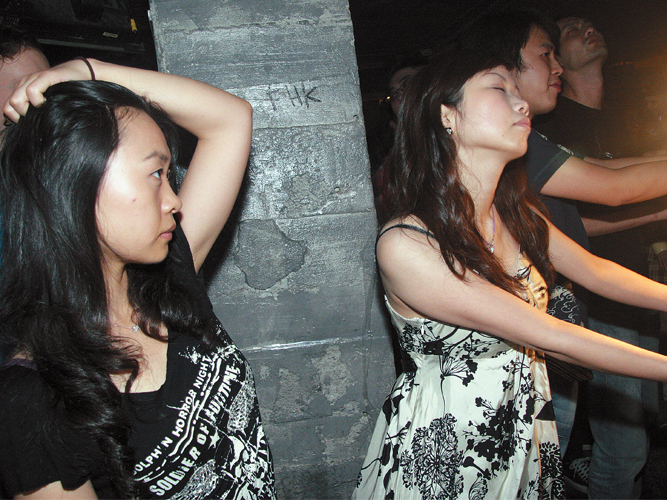
Shanghaied
The “Whore of Asia” swarms with three million inhabitants. In the French Concession, men lie dazed amidst clouds of opium smoke, their eyes needle points. Slatternly wenches tend to their pipes and their sexual needs. A hundred thousand prostitutes in white high heels click through the brothels; the prettier ones present themselves as high-class courtesans. Burlesque girls dance in jazz clubs before besotted crowds. On North Henan Road, in “The Wheel,” a notorious gambling den, young men lose more money than they make.
I knew Old Shanghai from high school books. I knew of it, too, from James Ivory’s The White Countess, a tale of mobsters, mansions, and money, of decadence and booze. I badly wanted to see it for myself.
Glitz and Gleaming Glass
I walk through the sparkling white halls of the new $2 billion Pudong International Airport. My nose is pressed to the taxi window as we cruise down freshly-built roads lit by futuristic streetlights.
The super-clean financial district glitters like Vegas. Sombre businessmen troop into the Grand Hyatt, which spears 87 floors into the night sky. Skyscraper competes with skyscraper all the way. The undisputed winner: The 101-storey Shanghai World Financial Center.
Money, clean money, is everywhere. Everyone moves to its inaudible beat — taxi drivers, window-washers, businessmen — not one out of step. Where were the hellraisers?
Old Shanghai was tamed in 1949, when the Communist Party ended drugs and prostitution by decree. Addicts were forced into rehab, opium den owners were hounded out, gaming tables were overturned. In their place rose an immaculate, luxuriant, global hub. The new Shanghai is a Singapore wannabe; it flaunts its wealth and the fact that it is squeaky clean.
New Shanghailanders, affluent foreigners who swarmed back over the last ten years, meet over power breakfasts at five-star hotels, take pictures in the afternoon from polished observation decks. Mostly, they meet in Xin Tian Di, in the old French Concession, where opium once ruled. They buy expensive Chinese suits, sip wine and avoid Shanghai cuisine. Xin Tian Di is modelled after the Old Shanghai. The buildings are styled like shikumen, brick houses built in the 1860s influenced by Western and local tastes.
The Underbelly
At night, we stroll between Xin Tian Di’s brick buildings, watching the rich go by. From a bar called Luna, we hear the reverberations of a band named Friction. We follow the sound of the bass inside.
A group of hippyish, seemingly drug-addled Filipino musicians pound out Pink Floyd and Deep Purple. The lead singer, in a tight black tanktop, sings in a voice that’s Janis Joplin turned Eartha Kitt. Foreigners in business suits sing drunkenly along. They are in love with her.
The waitresses wear tight clothes, white costumes that call to mind fantasy air hostess uniforms. An ordinary-looking Chinese girl in a very short skirt beckons my friend. He talks to her for a while and then, to the sound of throaty classic rock, they kiss. She asks him if he wants to go somewhere. It is then he realises she is a prostitute.
At the karaoke bar, the only women present are the karaoke girls, who talk to you, sing with you, and then offer a dance for money. They are polite, they allow a kiss, nothing else. When the song is over, you’re done too.
The night is waning; we amble out. A group of young American and European business types stroll with us through silent streets to Fuxing Xi Lu; a dusty door that leads to an unlit tunnel. And then we are in an old bomb shelter, listening to the beats of an international DJ our expats all seem to know. I am tipsy; I go to wash my face. Wannabe-punk teens are popping bright-coloured pills — Want one? There is an opium haze in the air. But the club-goers at The Shelter are more interested in a powder they call “China white.” As I order another drink, I see needle-eyed people taking heroin in the shadows; I remember that it’s a derivative of opium, only more potent.
We decide to go. I am secretly relieved. We emerge into the gray morning. The expats, suits crumpled, leave; their night isn’t over, though. I remember the books that say China is a nation of gamblers and always will be; because — take your pick — it is also a nation of the poor hoping for a miracle, or because it lacks a national game, or — my favourite — because Confucius said card games would win the favour of the gods. Whatever the reason, gambling never disappeared.
Even at this unholy hour, thousands of people are betting behind closed doors, my friend tells me. Send out a whisper and you will be led to the nearest den. They play cards, the pebble-counting Fan-Tan, the Domino-like Pai Gow, and Mah Jong.
Now swollen to 20 million, Shanghai is everything China’s ruling party wants it to be. Its skyscrapers attract flocks of tourists. The streets are clean and the metro lines extend tentacles of fresh, fast train cars, ever widening the city. Elite housing communities spring up, nestled between skyscrapers. Well-heeled merchants gather in these places and in Xin Tian Di.
Beneath this veneer, Old Shanghai still lurks. It is there, in the exposed legs of the karaoke girl, in the click of the mahjong tiles, in the powder of opium’s more dangerous cousin. It is there — as doped up, lusty and greedy as it always was.
(This story appears in the 19 June, 2009 issue of Forbes India. To visit our Archives, click here.)
Post Your Comment















